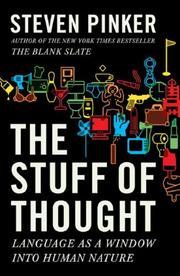Language as Set Theory
The revolution in our understanding of the logic of names began with a basic question: Where do the meanings of words live? There are two likely habitats. One is the world, where we find the things that a word refers to. The other is in the head, where we find people’s understanding of how a word may be used.
For anyone interested in language as a window into the mind, the external world might seem to be an unpromising habitat. The word cat, for example, refers to the set of all the cats that have ever lived or will ever live. But no mortal can be acquainted with all cats, past, present, and future. Also, many words don’t have any referent in the world at all, such as unicorn, Eliza Doolittle, and the Easter Bunny, but the words are certainly meaningful to the person who knows them. Finally, people can use words with very different meanings to refer to the same thing in the world. The textbook example is the Evening Star and the Morning Star, which turned out to be two names for the planet Venus. But they certainly have different meanings to people who are innocent of astronomy and have no way of knowing that they refer to the same heavenly body. There is another well-known example of two words that refer to the same thing in the world but mean different things to a person. The words are Jocasta and Mom, and the person is Oedipus.6 As we have seen so often, semantic niceties can make a difference.
The alternative to the idea that the meaning of a word is the set of things it refers to is that it is some kind of description, like a definition in a dictionary, or a formula in logical or conceptual symbols. Mathematics gives us an obvious model for how a finite description can stand for an infinite set of items. For example, “the set of natural numbers divisible by two without remainder” is ten words long, but it picks out the set of even numbers, which is infinite. Mathematics also shows us how two different expressions can pick out the same things: another expression for even numbers is “the set of natural numbers including zero and all the numbers that result from adding two to it any number of times.” Returning to language, the meaning of cat might be “a small domesticated mammal that has soft fur, sharp claws, pointed ears, and, usually, a long furry tail, widely kept as a pet or to catch mice.”
The two meanings of “meaning” are sometimes referred to as reference (a thing or set of things in the world) and sense (a summary formula).7 A sense is not necessarily in anyone’s head; it is an ideal characterization of a concept behind a word, which individuals who speak the language may know to varying degrees. But to the extent that people have some concept in their heads that corresponds to the sense of a word, they can be said to know what the word means. An advantage of the definition of cat over the set of all cats is that the definition can fit inside a person’s head. Of course, somehow a word-knower must be able to identify the things that a word refers to. But at least in principle, the sense of a word can be put to use in picking out its referents in the world. In the case of cat, just look for small domesticated mammals with soft fur, sharp claws, pointy ears, and so on. A word’s sense can thus keep a person in touch with the word’s possible referents even if they are infinite in number or remote from experience.
Notes:
Folksonomies: semantics set theory
Taxonomies:
/pets/cats (0.574099)
/science/social science/linguistics/translation (0.404903)
/law, govt and politics (0.382054)
Keywords:
word (0.973574 (positive:0.107467)), sharp claws (0.928257 (neutral:0.000000)), different meanings (0.927732 (positive:0.295022)), natural numbers (0.886970 (positive:0.254723)), world (0.884573 (positive:0.276553)), small domesticated mammal (0.882415 (neutral:0.000000)), small domesticated mammals (0.875203 (neutral:0.000000)), long furry tail (0.867861 (neutral:0.000000)), set (0.858779 (positive:0.480463)), words (0.857953 (positive:0.356730)), things (0.781595 (positive:0.326416)), Set Theory (0.761633 (positive:0.406486)), likely habitats (0.755878 (neutral:0.000000)), basic question (0.742405 (positive:0.406486)), person (0.742280 (positive:0.624749)), word cat (0.740821 (neutral:0.000000)), Eliza Doolittle (0.734037 (positive:0.337734)), infinite set (0.731195 (positive:0.619495)), unpromising habitat (0.730434 (neutral:0.000000)), textbook example (0.726852 (neutral:0.000000)), external world (0.726850 (neutral:0.000000)), well-known example (0.724226 (positive:0.258084)), pointy ears (0.719753 (positive:0.294241)), planet Venus (0.719716 (neutral:0.000000)), Easter Bunny (0.719410 (positive:0.395495)), heavenly body (0.719238 (neutral:0.000000)), obvious model (0.715805 (positive:0.619495)), semantic niceties (0.715191 (negative:-0.274204)), different things (0.711363 (neutral:0.000000)), Evening Star (0.710151 (neutral:0.000000))
Entities:
Eliza Doolittle:Person (0.780804 (positive:0.337734))
Concepts:
Set theory (0.974832): dbpedia | freebase | opencyc
Mathematics (0.903571): dbpedia | freebase | opencyc
Set (0.865651): dbpedia | freebase
Meaning of life (0.833742): dbpedia | freebase | yago
Number (0.825668): dbpedia | freebase
Semantics (0.803774): dbpedia | freebase | opencyc
Real number (0.739687): dbpedia | freebase | opencyc
Natural number (0.731944): dbpedia | freebase | opencyc





